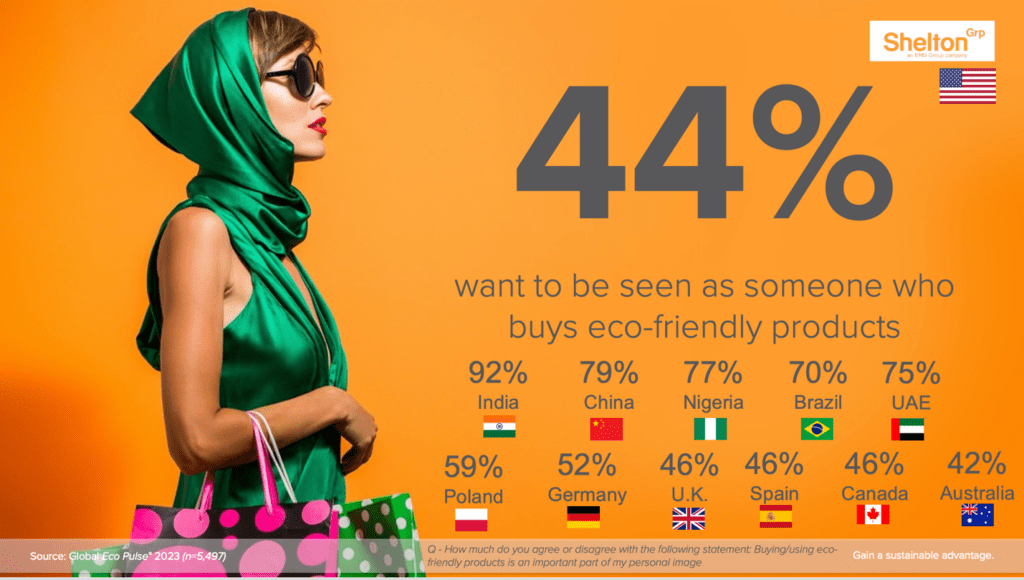The world is green (at least, that’s what we want people to believe)
Shelton Stat of the Week
61% of people around the world say buying/using eco-friendly products is an important part of their personal image.
— Eco Pulse®, 2023 (Global)
So here’s an interesting thing: Ten years ago, 33% of people in America said they wanted to be seen as someone who buys eco-friendly products. Today, that number sits at 44%. So, an 11-point increase over 10 years. Not bad.
But while we don’t have the global trend (we took our standard US-based Eco Pulse® survey global for the first time this year), you can see from the chart below that the US lags behind most of the rest of the world.

But where it gets really interesting is how we conceive of people who are “green.” In other words, the activities and behaviors you expect an eco-friendly person to do varies depending on which country you live in.
For instance, in India, the most important indicator of an eco-friendly person is the purchase of eco-friendly products. The top five most important activities that indicate an eco-friendly person to someone in India are:
- Purchasing eco-friendly products
- Recycling their trash
- Reusing items when possible
- Bringing their own bags when they go shopping
- Purchasing organic foods AND drinking from reusable containers instead of disposable water bottles (tied)
But in Spain, the order and activities change:
- Recycling their trash
- Reusing items when possible
- Bringing their own bags to the grocery store
- Drinking from reusable containers instead of disposable water bottles AND choosing an eco-friendly option for transportation (tied)
- Adjusting their thermostat to save energy
In China, the list looks a bit different as well:
- Purchasing eco-friendly products
- Choosing an eco-friendly option for transportation
- Bringing their own bags when they go shopping
- Recycling their trash
- Volunteering or giving to environmental causes
Unsurprisingly, in the US, it’s all about recycling and reuse (and a little bit of shopping):
- Recycling their trash
- Reusing items when possible
- Bringing their own bags to the grocery store
- Drinking from reusable containers instead of disposable water bottles
- Purchasing eco-friendly products
So, as sustainability marketers, what should we make of all of this? Globally, there’s a general desire to virtue signal through our purchases and/or to put our wallets where our values are. The degree to which that’s a culturally held value depends on the country. But the takeaway is that being seen as eco-friendly is generally a good thing around the world. What brands should be doing to let consumers live out that value and express their eco-friendliness through a brand depends on the country. In China, brands should heavily advertise green product claims AND tie themselves to green transportation (telling the company/brand transportation story or possibly sponsoring mass transit that’s eco-friendly). In Spain and in the US, brands should heavily promote the recyclability of their products and packages AND roll out easy ways to reuse and refill packaging.
Bottom line, tell your sustainability story at the corporate and product level. And give consumers easy ways to promote their personal green brands through your brand.

Consumers are in fact buying sustainable goods: Highlights from new research
— McKinsey
The evidence is out there that sustainability claims impact purchase behavior. This McKinsey article covers a discussion about a new report assessing 5 years of sales data and 44,000 brands to track sustainable purchase behavior.

New data show consumers increasingly choose products in sustainable packaging
— Packaging Strategies
Not only are consumers aligning their purchases with their ESG values, but they’re often willing to pay more for these products. This Packaging Strategies article discusses how the type of packaging and claims on packaging directly impact purchase behavior.
Buzz On Buzzwords
Find out what Americans think about sustainability, what different “green” words mean to them and how they interpret and respond to the jargon you may be using.


-
-
-
-
-
-
-
-
-
-
-
-
-
-
-
-
TAGS:Corporate Sustainability, Energy & Environmental Marketing